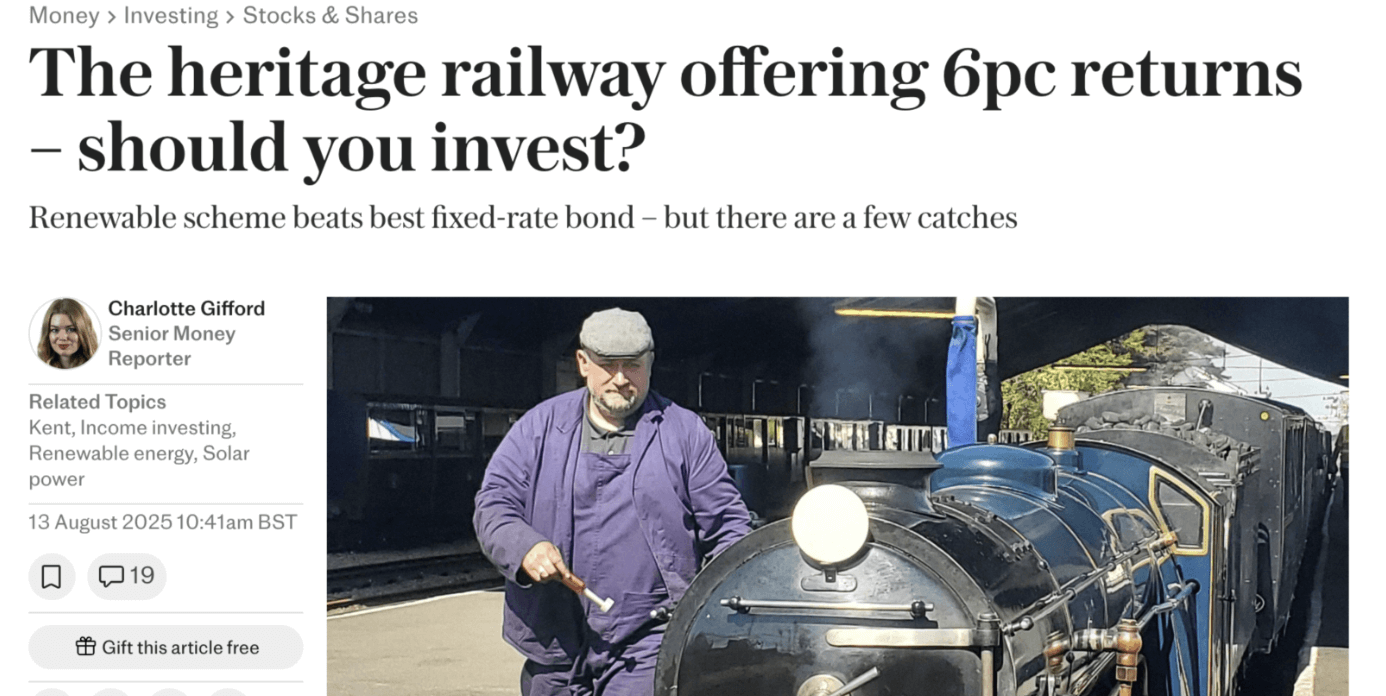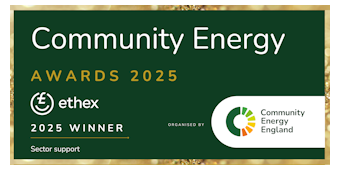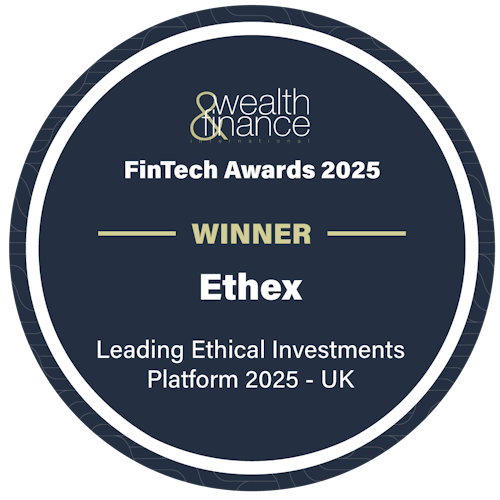Don’t invest unless you’re prepared to lose all the money you invest. This is a high - risk investment and you are unlikely to be protected if something goes wrong. Take 2 mins to learn more

investing
Community shares in the headlines. Why it matters.
Why a recent article about a community share offer in the Telegraph, even with its inaccuracies, should be celebrated.
Last week, The Telegraph ran a piece on the Kent Community Energy share offer, linking it to the historic Romney, Hythe and Dymchurch Railway.It’s not every day that community shares make the pages of the national money section, so first and foremost, this is a milestone. We’d like to thank them for shining a spotlight on community shares and recognising them as a legitimate way for people to invest with impact.
That said, the misleading headline, suggesting that this is a direct investment in a heritage railway (rather than a community renewable energy organisation), underlines that more awareness and education are needed in the financial sector, as well as at a grassroots level on community shares, as people may assume they are an investment into a share project. . The headline assumed it was a traditional equity style investment.
At Ethex, we're determined to educate people that community shares are, in fact, a powerful yet often misunderstood tool, different from other types of investments most people are accustomed to reading about (including the average Daily Telegraph stock column reader).
What are community shares, really?
Community shares are withdrawable shares issued by co-operative and community benefit societies (think of them like a company run by a group of people with shared interests, with their own defined rules that sit within a co-operative structure). They are an instrument used by community businesses, controlled by their members, that are focused on social, environmental or community objectives. Rather than maximising returns to shareholders, they aim to provide a fair return to investors. One example of a well-recognised UK co-operative is The Co-Operative Group (Co-op), owned by millions of members who have a say in how the business is run.
Community share offers are designed to give people the chance to support grassroots projects financially while earning a fair return. Unlike ordinary shares, they are not speculative instruments.
Here are some features of community shares:
- They are not speculative. They target a rate of interest rather than capital gains or dividends.
- There is no secondary market. Investors instead can apply to withdraw capital, subject to the rules of the society and the discretion of its directors.
- Capital and interest are at risk. Importantly, this means they have the same inheritance tax advantages as ordinary shares in private companies. One member, one vote (as opposed to one share, one vote).
- Direct, measurable impact which is more transparent and immediately visible than investing in standard investments or even in an "ESG" or "ethical" fund.
- Importantly, the fact that Community Shares are a form of risk capital means that they qualify as a Business Asset for Inheritance Tax purposes. This is a significant and underappreciated benefit. Most people do not have the opportunity to invest in other types of Business Asset, such as private company shares or agricultural land. However, anyone can buy community shares. (See a recent article we wrote on this here)
At Ethex, we list both withdrawable and community shares and bonds as investment products. All these allow people to invest, receive interest, and eventually get their money back. Community shares aim to give investors not only a fair financial return but also a genuine stake in a project or organisation that provides the holder membership and voting rights. This means your investment gives you a voice as well as targeting a return.
That distinction matters. These shares are not about short-term trading but are about long-term commitment to the community projects they support, whether that’s solar panels on schools, local transport, or community-owned renewable energy to cut bills and carbon.
Why community shares are also important for impact investing
Community shares put people at the heart of vital change. They’re a key part of the UK’s clean energy transition and one of the most widely used tools for community energy projects.
By investing through community shares, everyday people can channel their savings into something more tangible than a balance sheet. The results are real and measurable: lower energy bills for care homes and schools, fewer tonnes of CO₂ released into the atmosphere, and stronger, more resilient local communities.
Community shares also have the potential to democratise finance. That can mean shifting power from distant shareholders to the people who live in and benefit from the projects themselves. We’ve seen firsthand how investors value the ability to directly invest a portion of their portfolio to achieve both a social or environmental impact and a reasonable financial return.
Kent Community Energy, the project highlighted in the Telegraph article, is a recent example of this. Their community share offer is funding a portfolio of new rooftop solar installations on community buildings in Kent, including a dementia centre, a mental health charity and the Romney Heritage Railway (which was wrongly named in the Telegraph article as having launched the share offer). Each of these organisations will benefit from a discount of around 25% on their electricity bills while drastically reducing their carbon footprint.
You can view the offer here.
A step forward in recognition
It’s worth celebrating that journalists and editors are starting to treat community shares as part of the broader conversation about money and investing. This shift suggests that the mainstream is waking up to the idea that financial choices aren’t just about profit but are also about values, resilience, and long-term impact.
There’s still work to do in explaining the nuances, and at Ethex, we will continue to help investors understand the risks and the impact, as well as the financial rewards. But the fact that we’re having this conversation in national money pages is a step in the right direction.
In summary, if you’ve seen the headlines and are curious, we encourage you to look beyond the “returns” and discover what community shares really mean. That is people-powered finance for people-centric change.


